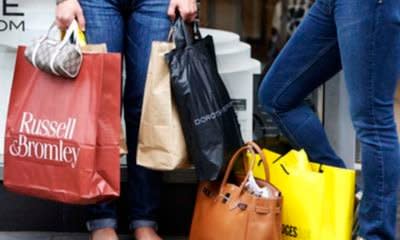Retail Sales Rise As Spending Jumps In July

Shoppers have shrugged off post-Brexit fears as retail sales increased by more than expected in July, according to official figures.
Retail sales volumes, including fuel sales, increased by 1.4% in July compared with June, the Office for National Statistics (ONS) said, exceeding all forecasts that pointed towards a 0.2% rise.
It comes after retail sales fell by a worse-than-expected 0.9% in June as poor weather dampened demand for summer fashions and footwear,
"These are strong numbers showing a pronounced increase in sales compared with last July," said chief economic adviser at the ONS, Joe Grice.
He suggests the warm weather could be major factor with "sales of clothing and footwear doing particularly well."
"There is also anecdotal evidence from respondents suggesting the weaker pound has encouraged overseas visitors to spend," he added.
Department stores and specialist retailers are among those reporting a good month.
Sales of watches and jewellery were up 16.6% in July compared with the same month last year - the biggest jump in nearly two years, which could be due to the weaker pound tempting overseas buyers to splash out on luxury items.
Sterling rose 0.4% against the dollar to $1.31 and 0.2% against the euro to €1.15 following the announcement.
The results suggest UK shoppers have shrugged off fears following Britain's decision to leave the EU in June.
Larger retailers including John Lewis, Next (Other OTC: NXGH - news) and Tesco (Xetra: 852647 - news) say they have not been affected by the referendum result so far, while data released earlier this month by the British Retail Consortium showed spending bounced back in July .
Capital (Other OTC: CGHC - news) and Regional, which owns seven shopping centres in the UK said that the demand from retailers to rent space has also been unaffected by Brexit.
CEO Hugh Scott-Barrett said: "Our letting activity remains robust and, while it is too early to point to any definitive trends, so far we have seen no signs of the abating past the EU referendum."
Whilst the data suggests consumer spending has remained resilient, the CBI is warning that it's likely that spending will fall in the months ahead.
"The recent fall in the pound will push up the cost of everyday purchases over the coming year, which will eat into households' spending power," said CBI head of economic analysis, Anna Leach.
She (Munich: SOQ.MU - news) added that it is critical the "government sets out a clear plan and timetable for the forthcoming EU negotiations."
Economists are urging caution and stress the importance of not clinging to one month's data.
"So far the Brexit vote is failing to make a dent in hard economic data, despite confidence surveys being universally appalling," said Laith Khalaf, senior analyst at Hargreaves Lansdown (LSE: HL.L - news) ,
"It's early days yet, but evidence is gathering that a dip in sentiment may not be borne ou by economic activity, either by consumers or business," he warned.
"It's important not to hang too much significance on one month's set of figures, but the Bank of England might start to feel uncomfortable about its interest rate cut if economic data continues to follow this robust trend."
The Bank of England reduced its forecast for household spending over the next two years by over 50% in light of the vote to leave the EU.
The Bank cut interest rates earlier this month from 0.5% to 0.25% as part of measures to boost the economy and has indicated that it could reduce the base rate further if required.
The lower the interest rate, the more willing people are to borrow money to make big purchases such as houses and cars, and this subsequently can create a ripple effect of more spending throughout the economy.

 Yahoo Finance
Yahoo Finance 